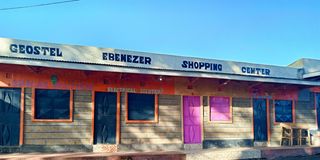My Hood: The slow growth of Arap Chumo estate in Nakuru

A shopping centre in Arap Chumo estate in Nakuru city.
We alight our matatu at the Ngata Bridge. From here, you can see a stuck of houses with two main inroads. Both can be used to access Arap Chumo estate.
One is tempted to think, who would live near the highway in light of the constant noise from the vehicles? However, as you go deeper into the estate you are met by serenity and calm.
Just like most of the estates in Nakuru, there is a busy business centre characterized by mama mbogas busy cutting vegetables, while others stand near the warm jiko roasting maize for sale.
On the other side of the centre two pool game arcades come to life as voices of young men fill the air.

A section of roads in Arap Chumo estate in Nakuru city.
Story has it that the estate was named after Koskei Chumo, a man believed to have been one of the late President Daniel Arap Moi’s cook.
Here, many of the houses are private residences.
Wycliffe Maroro, a resident of Arap Chumo says that the estate has gained popularity over the years due to the fact that it is near the dangerous Ngata Blackspot.
“The estate sits on 150 acres of land. Over the years, it’s the people who live here that have helped it grow with various projects such as putting up rental houses and business stalls,” he says.
Maroro adds that the estate mostly encompasses youth who opt to settle in the bedsitters and one-bedroomed houses that go for sh. 5,000 and sh. 8,500 respectively.
He confirms that many of the young adults like hanging out in some of the pool joints where they pass time.
"Many people in this area enjoy convenience. Therefore, they would opt to buy their groceries and other items in the shops nearby. This is because the city centre is about 7 kilometres from here," he notes.
From what we observed, anyone looking to come to the estate at night would have to use private means or a bodaboda, as the matatus serving this route stop working from around 8pm.
The main challenge in the area, Maroro says, is the lack of safe drinking water.
"Residents especially those with private residences depend on harvesting rain water but during the dry season they are forced to buy water which is very expensive" he laments.

